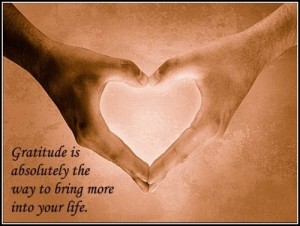Contributing Writer for Wake Up World
With all the insanity in the world, it is easy to become bogged down with negativity. Destructive weather, economic meltdowns, a toxic environment, GMOs. The list could go on forever. It is natural to become disillusioned, depressed and hostile in light of such bad news. But researchers have discovered that even when the environment around us is cloaked in apparent darkness, we can still be happy, healthy, alert — and make a positive impact. As we become more appreciative, vibrancy and energy returns, stress is reduced and we are able to connect with others in a beneficial way.
The science behind gratefulness
Doctors Blaire and Justice at the University of Texas Health Science Center believe that “gratitude is truly amazing in its physical and psychosocial benefits.” A tall order for something as simple as feeling grateful, but research has found that an orientation of gratitude will:
– Encourage higher levels of alertness, vitality, enthusiasm, determination, attentiveness and energy
– Reduce physical symptoms like headaches, coughing, nausea or pain
– Boost immunity in both sick and healthy persons
– Lower stress response and blood pressure
– Curb depression and anxiety
– Cool anger and diminish resentment
– Cultivate compassion and empathy
– Increase positive social connections
Robert A. Emmons, Ph.D., from the University of California Davis, confirms these benefits. Emmons, along with his colleague Mike McCullough of the University of Miami, conducted an experiment where participants were given one of three tasks. A weekly journal was kept by each randomly assigned individual either recording grateful thoughts, hassles and frustrations or neutral circumstances that were neither positive nor negative. After 10 weeks, those in the gratitude group were 25 percent happier about their lives than the group that documented frustrations. They also had fewer health complaints and exercised longer by 1.5 hours.
Another study found that individuals with congenital and adult-onset neuromuscular disorders (NMDs) also benefited from gratitude journaling. For those who kept a gratitude journal, quality of sleep was enhanced with longer hours and a more refreshed feeling upon waking. They also felt increased optimism about the upcoming week, more satisfaction with their lives and a greater connection to others compared with the non-journaling participants in the study.
Practices for cultivating gratitude
This all sounds well and good, but how do we begin to instill more gratitude into our hectic days? A common theme among positive psychologists: start small and slow down. Here are a few suggestions to get the ball rolling:
– Keep a daily gratitude journal
– Appreciate nature, a good meal or an object of beauty
– Write a detailed thank you note
– Count blessings each day
– Spend a few moments in silent prayer with a focus on thankfulness
– Show appreciation for a coworker, mate or family member
Reality check
Still daunted by the idea of cultivating a grateful orientation day in and day out? Michigan positive psychologist Christopher Peterson offers a bit of insight:
“I’m not a Pollyanna. And obviously, someone who’s unrelentingly cheerful can be a pain in the ass. … There are no long-term quick fixes for happiness. So if you become a more grateful person and you add those exercises to your repertoire, you’ll be different six months or a year from now. But if you say okay, I’m done with the story and I’m going back to the way I was, it’ll just have been a six-week high. There’s nothing wrong with that, but it’s not going to permanently change you.”
Article Sources
“The Neuroscience of Why Gratitude Makes Us Healthier” Ocean Robbins, Huffington Post, November 4, 2011. www.huffingtonpost.com
“In Praise of Gratitude” Harvard Health Letter, November 2011. www.health.harvard.edu
“Extending the Tradition of Giving Thanks Recognizing the Health Benefits of Gratitude” Grif Alspach, RN, MSN, EdD, Editor, Critical Care Nurse, December 2009. http://ccn.aacnjournals.org/content/29/6/12.full
“Why Gratitude is Good” Robert Emmons, Greater Good, November 16, 2010. http://greatergood.berkeley.edu/article/item/why_gratitude_is_good
“10 Ways to Become More Grateful” Robert Emmons, Greater Good, November 17, 2010. http://greatergood.berkeley.edu
“A Serving of Gratitude May Save the Day” John Tierney, The New York Times, November 21, 2011. http://www.nytimes.com
“Stumbling toward Gratitude” Catherine Price, Greater Good, Summer 2007. http://greatergood.berkeley.edu
“Fulfillment at Any Age” Susan Krauss Whitbourne, Ph.D., Psychology Today, May 25, 2010. http://www.psychologytoday.com
Previous Articles By Carolanne
- Failing Economies Take Note: Iceland’s Silent Revolution May Hold the Solution to Financial Woes
- Rid the Body of Dangerous Bt-Toxin Found in Genetically Modified Food with These Tips
- Sugar Consumption a ‘Public Health Crisis’ Aggravated by GM Sugar Beets
- Encourage Prosperity, Alleviate Famine and Heal the Environment with Hemp
- Halt Infectious Disease, Cancer and Much More With a $3 Remedy
- Political and Corporate Elite Shun GM Food on Their Own Plate
About the author:
I’m Carolanne — a writer, chef, traveler and enthusiastic advocate for sustainability, organics and joyful living. It’s good to have you here. If you would like to learn more, connect with me at Thrive-Living.net or visit Twitter.com/Thrive_Living.Please note this article was first published on Natural News.

If you've ever found value in our articles, we'd greatly appreciate your support by purchasing Mindful Meditation Techniques for Kids - A Practical Guide for Adults to Empower Kids with the Gift of Inner Peace and Resilience for Life.
In the spirit of mindfulness, we encourage you to choose the paperback version. Delve into its pages away from screen glare and notifications, allowing yourself to fully immerse in the transformative practices within. The physical book enriches the learning process and serves as a tangible commitment to mindfulness, easily shared among family and friends.
Over the past few years, Wake Up World has faced significant online censorship, impacting our financial ability to stay online. Instead of soliciting donations, we're exploring win-win solutions with our readers to remain financially viable. Moving into book publishing, we hope to secure ongoing funds to continue our mission. With over 8,500 articles published in the past 13 years, we are committed to keeping our content free and accessible to everyone, without resorting to a paywall.








